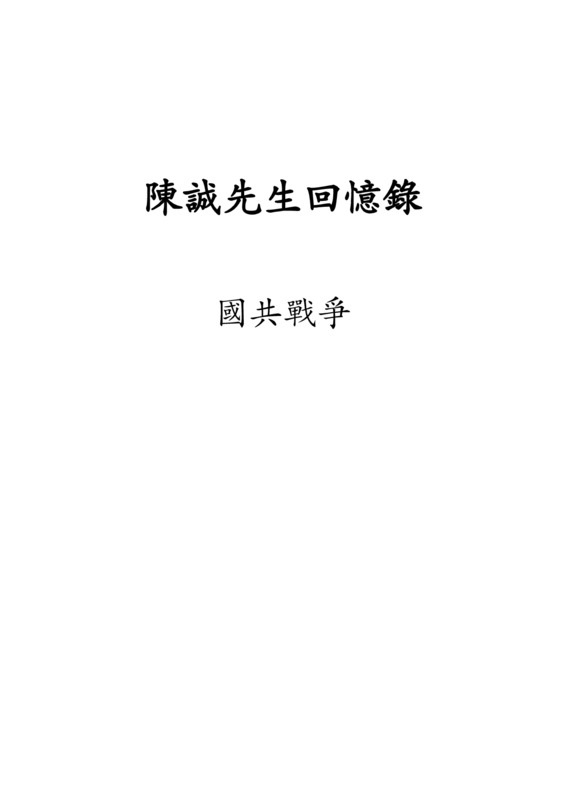Explore the collection
Showing 5 items in the collection
5 items
Book
Active Life
This is a collection of essays by Cui Weiping, a professor at the Beijing Film Academy. The title, inspired by Hannah Arendt, covers a wide range of fields from poetry and movies to politics and ethics, and tells the stories of fascinating people, the construction of their inner world and external lives. These people include Hai Zi, Wang Xiaobo, Arendt, Woolf, Beauvoir, Tarkovsky, Kremer, Herbert, Havel, and many others. Behind these seemingly unrelated names, there are hints of these two interdependent spiritual dimensions: on the one hand, the construction of the external world in which we live; on the other hand, the construction of our own inner world, which cannot be neglected. This book, published by Renmin University of China Press in 2003, has had a significant impact on the development of civil society in China.
Book
Chen Cheng's Memoirs—The War between the Nationalists and Communists
Mr. Chen Cheng (courtesy name Cixiu; alias Shisou) served as the commander of the KMT army, commander-in-chief of the group army, commander-in-chief of the theater of operations, and chief of the general staff of the KMT. After the defeat of the Kuomintang army in Taiwan, Chen Cheng served the Administrative Yuan as Vice President of the Kuomintang. The volumes associated with *Chen Cheng's Memoirs* were published by Taiwan's National Museum of History in 2005. The series is divided into six volumes: *The Northern Expedition and the Chaos* (one volume), *The War between the Nationalists and Communists* (one volume), *The War of Resistance Against Japanese Aggression* (two volumes), and ***The Construction of Taiwan*** (two volumes). The first volume, *The War between the Nationalists and Communists* includes three parts: *Suppressing the Communists - Memories of the Military*, *Summary of Mr. Chen's Words and Actions*, and *Correspondence and Telegrams*. The book has original historical materials related to the five sieges and the counter-insurgency. In particular, this is the first time that important historical materials regarding the correspondence between Chiang Chung-cheng (courtesy name of Chiang Kai-shek) and Cixiu have been made public.
Book
In the Palm of Buddha (Updated Edition)
Zhang Dongsun is an unavoidable but deliberately obscured figure in modern China. Considered the earliest translator of Western philosophy, a famous newspaperman, political commentator, and professor at Yenching University; the first mediator between the Kuomintang and the Communist Party in 1949, and the first Central People's Government Member. He was convicted of treason in 1951 and disappeared. The well-known writer and journalist Dai Qing completed this historical documentary after eight years of investigation and writing and nearly ten years of revising and updating. Taking Zhang Dongsun's life as the main theme, he wrote about changing times from the late Qing dynasty to the Cultural Revolution.
An expanded edition of this book will be published by the Chinese University of Hong Kong Press in 2022. The following is the link to purchase books from the publisher:
https://cup.cuhk.edu.hk/index.php?route=product/product&product_id=3466
Film and Video
Working toward a Civil Society (Episode 5): Cui Weiping
The Xi’an-based videographer Zhang Shihe, or Tiger Temple, has been a fixture on the independent Chinese history scene for more than twenty years. In 2010, he began a thirty-part series of short interviews with leading Chinese thinkers called “Working Toward Civil Society,” in which he explores how China can build a true civil society. Some of those interviewed have now been silenced, passed away, or moved abroad, making the series itself a work of history.
In this episode, Zhang interviews one of China’s most thoughtful public thinkers, Cui Weiping. Cui is a professor at the Beijing Film Academy, and translator of Havel into Chinese. She was a signer of Charter 08, and friend of the late Nobel Peace Prize laureate Liu Xiaobo. Although the interview is only 8 minutes long, Cui touches on some of the key problems that continue to plague China: how to break free of overwhelming government control of civic life?
Note to English speakers: this interview only has Chinese subtitles. The CUA is working to add English subtitles to all of our video offerings so check back in a few months.
Book
Yangtze Yangtze
In March 1989, the book Yangtze Yangtze was published by the Guizhou People's Publishing House just as the Tiananmen student protests were about to begin in Beijing. The book fed into this intellectual ferment, challenging the technocratic reasons for the Three Gorges Dam, which eventually would dam the Yangtze River in the name of flood control and electrical power generation.
The book was edited by the journalist Dai Qing, the daughter of a well-known Communist Party activist and leader. The book challenged the project's decision-making process, with a broad array of scientists, journalists, and intellectuals arguing that it was not democratic and did not take into account all viewpoints. It was widely read in China and translated into foreign languages.
After the Tiananmen protests were violently suppressed, Dai Qing was arrested and imprisoned for ten months in Qincheng Prison as an organizer of the uprising. Yangtze Yangtze was criticized as “promoting bourgeois liberalization, opposing the Four Fundamental Principles (of party control), and creating public opinion for turmoil and riots.” The book was taken off the shelves and destroyed, with some copies burned. It became the first banned book resulting from the decision-making process of the Three Gorges Project.
The book is banned in China. The English-language edition can be read online at Probe International: https://journal.probeinternational.org/three-gorges-probe/yangtze-yangtze/.




